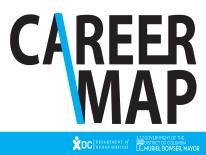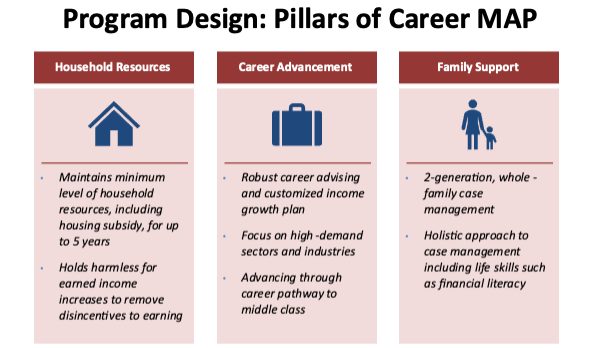
The District’s Career Mobility Action Plan (Career MAP) is a groundbreaking pilot designed to remove barriers that families confront as they pursue employment that can sustain their families. For up to five years, the pilot is providing resources directly to families who have experienced homelessness, are committed to pursuing a career, and are at risk of losing cash, food, health care, childcare, and housing benefits more quickly than their income can cover these lost resources (also known as 'benefits cliffs').
Career MAP takes a holistic, two-generational approach to supporting families. As Ascend at the Aspen Institute models, a two-generational approach includes the foundational components of family well-being: career pathways, child development, financial assets, health and wellbeing, and social capital. Most importantly, Career MAP recognizes families as drivers of their own success, and the program will tailor service connections to meet the needs of individual participants.
Who Qualified
District residents participating in a qualifying housing assistance program who are committed to pursuing a career.
Career MAP randomly selected eligible families beginning in Summer 2022 who were participating in the Family Re-Housing Stabilization Program (FRSP) and applied for the program.
At this time, only these 500 families will be supported through Career MAP, and no additional applications will be accepted.
Program Services
The Career MAP program provides a broad range of services to help participants achieve their goals. The three pillars of Career MAP support consist of:

Household Resources:
- Up to 5 years of rental assistance, discounted rent to compensate for any lost Supplemental Nutrition Assistance Program (SNAP), or District cash assistance benefits as a family’s income increases. Families pay 30% of their gross income in rent, less any discounts if they remain in compliance with program rules.
- Cash fund of up to $10,000 per year that reimburses participants for losses of medical and childcare benefits as a family’s income increases, as well as any SNAP or District cash assistance benefit losses that can’t be covered through rent discounts. The $10,000 cap per year may be increased if funds are available.
- Escrow accounts that receive $200 deposits each month a household pays rent, resulting in up to $12,000 available to participants at the end of the program.
- Payments from cash funds for reimbursement or escrow are coordinated through a partnership with the Greater Washington Community Foundation (GWCF).
- Payments from cash funds for reimbursement or escrow are coordinated through a partnership with the Greater Washington Community Foundation (GWCF).
- Emergency payments of up to $1,000 per year to help families stay on track toward goals.
Career Advancement:
- A dedicated navigator, assigned from one of two competitively selected service providers, focused on each family’s career goals.
- Employment placement and career growth, including connections to paid work-based learning and a focus on promotions after initial placements.
- Education and training support, with a focus on programs aligned with employer hiring needs, including:
- Vocational training
- Work readiness and digital literacy skills development
- Adult education/GED (integrated with career programs)
- Higher education/ degree programs
Family Support:
- Dedicated navigator focused on each family’s personal goals.
- Peer support groups are facilitated to help participants build networks and communities with parents experiencing similar challenges.
- Coordinated access to key supports, including mental health, childcare, education, housing, and others.
- Financial management and benefits cliffs counseling.
What are “benefits cliffs”?
Currently, many families face "benefits cliffs" – a sudden and often unexpected decrease in their public benefits that can occur with a small increase in earnings. In many cases, this loss of benefits is larger than familes' increase in income, making them worse off. As a result, families are disincentivized to increase earnings as they work to move up the economic ladder and instead are pushed back down the ladder. Families need support to bridge these short-term benefits cliffs to achieve longer-term economic security.
In addition, given the highly fractured and siloed social safety net, made up of dozens of benefits across federal and local programs, it is complicated and difficult to predict the impact of a slight increase in income. Families – and support staff working to assist them – struggle to make informed choices that meaningfully improve their economic security. In support of this pilot, the District is working with the Federal Reserve Banks of Atlanta and Richmond to develop a District-specific "benefits cliff calculator,” a tool that support staff and families can use to calculate the impact of increased earnings in the short- and medium-term on their household net income.
The Big Picture: Updating Policy to Better Support Families
Career MAP will inform District policy decisions related to income support and upward mobility programs and may inform broader national policy. An evaluation of Career MAP and robust program monitoring will provide insight into how bridging benefits cliffs can promote economic mobility for District residents and implications for local and federal benefit programs. Additionally, Career MAP will inform the design of effective workforce development programs and two-generation supportive services. of Career MAP and robust program monitoring will provide insight into how bridging benefits cliffs can promote economic mobility for District residents and implications for local and federal benefit programs. Additionally, Career MAP will inform the design of effective workforce development programs and two-generation supportive services.
Additional Research
“Mitigating Benefits Cliffs for Low-Income Families: District of Columbia Career Mobility Action Plan as a Case Study” – Federal Reserve Bank of Atlanta
For additional information, please e-mail us at [email protected].